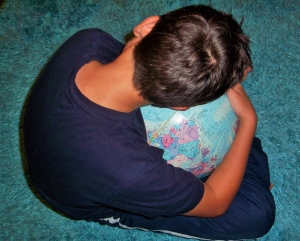
Boy caring for the Earth
Course name: The Inspiring Challenge of Sustainable Development (CSF101)
In this course you’ll learn how to apply an internationally recognised framework that integrates sustainability into a proven strategic planning process. It will enable you to define a vision of success and provide you with the tools you need to effectively and efficiently navigate your way there.
Course metrics
Notional learning hours: 40 hours.
Duration: 2 weeks, 10 hours per week.
Assessment: 20 hours.
Formal credit option: Yes, 4 credits of a 15-credit course towards a 120-credit credential at Otago Polytechnic.
Course: One of four micro courses for Creating Sustainable Futures.
Credential: The following articulation pathways are available:
Level: 1st year Bachelor Degree Level.
As the pressure builds and our global development continues to accelerate, our social, economic and environmental systems are falling further and further out of balance. Using a robust, yet simple, scientific foundation, this module will enable the learner to explore and understand how these fundamental systems are connected, and how they are being placed under increasing pressure. This context then provides the setting for an effective strategic methodology that can enable us to imagine and create a future where our society thrives.
What will I learn?
In this micro course you will:
- Gain insights into what’s already possible by exploring examples of sustainable and symbiotic industrial design.
- Learn how sustainable buildings are being built with the Living Building Challenge.
- Introduce the concept of systems thinking, and why this approach so critical to tackling issues of sustainability in an effective and meaningful way.
- Introduce the Natural Step’s Five Level Framework for an effective and strategic approach to sustainable development.
- Learn how the ecological system works, and how humans are adversely affecting it.
- Learn how the social system works.
- Learn how humans have become the dominant shaping force on the planet.
- Explore the definitions of sustainable development and sustainability.
- Understand how the social system works, and why meeting human needs sits at the very core of sustainability.
What’s involved?
There are 4 learning pathways each containing numerous resources and 5 activities, the last one being an assessment.
The learning pathways are:
- Sustainability is entirely possible
- Understanding systems
- From the Holocene to the Anthropocene
- Defining sustainability and sustainable development
The micro-course can be completed in 40 hours, assessments included.
What prerequisites should I have, if any?
Anyone is free to participate in this course. An internet connection and basic web browsing skills are recommended with the ability to create a blog and microblog account (instructions and self-study tutorials provided.) You are requested to keep a personal learning journal as reflection has been shown to increase learning markedly.
Learners aiming to submit assessments for formal academic credit will need to meet the normal university admission requirements of the conferring institution (e.g. language proficiency and school leaving certificates). Learners aiming for the 3rd year Bachelor level are advised to have completed the majority of their 2nd year level subjects to have sufficient capability and experience for preparing assignments for 3rd year level of Bachelor study.
Each micro-course uses the knowledge gained in the previous one. The following prerequisites are recommended:
| Course
|
Prerequisite
|
| CSF101 |
None
|
| CSF102 |
CSF101
|
| CSF103 |
CSF101, CSF102
|
| CSF104 |
CSF101, CSF102, CSF103
|
Course name: The Inspiring Challenge of Sustainable Development (CSF101)
In this course you’ll learn how to apply an internationally recognised framework that integrates sustainability into a proven strategic planning process. It will enable you to define a vision of success and provide you with the tools you need to effectively and efficiently navigate your way there.
Course metrics
Notional learning hours: 40 hours.
Duration: 2 weeks, 10 hours per week.
Assessment: 20 hours.
Formal credit option: Yes, 4 credits of a 15-credit course towards a 120-credit credential at Otago Polytechnic.
Course: One of four micro courses for Creating Sustainable Futures.
Credential: The following articulation pathways are available:
Level: 1st year Bachelor Degree Level.
As the pressure builds and our global development continues to accelerate, our social, economic and environmental systems are falling further and further out of balance. Using a robust, yet simple, scientific foundation, this module will enable the learner to explore and understand how these fundamental systems are connected, and how they are being placed under increasing pressure. This context then provides the setting for an effective strategic methodology that can enable us to imagine and create a future where our society thrives.
What will I learn?
In this micro course you will:
What’s involved?
There are 4 learning pathways each containing numerous resources and 5 activities, the last one being an assessment.
The learning pathways are:
The micro-course can be completed in 40 hours, assessments included.
What prerequisites should I have, if any?
Anyone is free to participate in this course. An internet connection and basic web browsing skills are recommended with the ability to create a blog and microblog account (instructions and self-study tutorials provided.) You are requested to keep a personal learning journal as reflection has been shown to increase learning markedly.
Learners aiming to submit assessments for formal academic credit will need to meet the normal university admission requirements of the conferring institution (e.g. language proficiency and school leaving certificates). Learners aiming for the 3rd year Bachelor level are advised to have completed the majority of their 2nd year level subjects to have sufficient capability and experience for preparing assignments for 3rd year level of Bachelor study.
Each micro-course uses the knowledge gained in the previous one. The following prerequisites are recommended:
Content is available under the
Creative Commons Attribution Share Alike License.
Privacy Policy | Authors